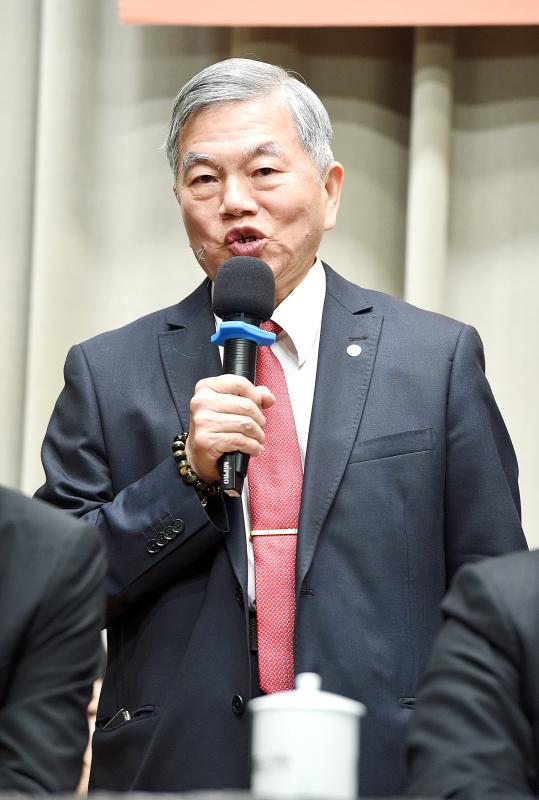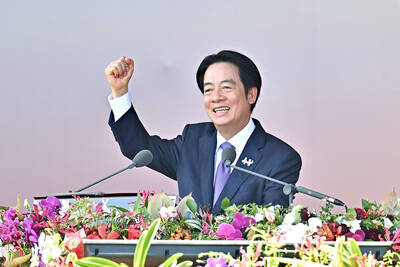The Ministry of Economic Affairs yesterday said that it would subsidize up to 40 percent of workers’ salaries for businesses that have been hard hit by the COVID-19 pandemic.
Funded by a NT$39.6 billion (US$1.31 billion) budget — part of a newly expanded NT$1.05 trillion economic stimulus package approved by the Executive Yuan on Thursday — the ministry plans to assist companies with employee wages to help prevent job cuts.
Companies facing an annual drop in sales of at least 50 percent for two consecutive months can apply for the financial aid, which would cover up to 40 percent of their employees’ monthly salaries for a maximum of three months, the ministry said.

Photo: Taipei Times
The ministry said that it would also subsidize a one-time injection of working capital for such firms, based on their number of employees, and hand out a 30 percent discount on utility rates.
The financial aid comes on top of another plan launched last week, which includes a 5 to 10 percent discount on utility rates for companies with at least a 15 percent decline in revenue on an annual basis.
The ministry said that it is also offering to defer rent for one to three years with no interest for companies operating production sites in the nation’s industrial parks and export processing zones.
While the ministry has aimed to shelter local industries from a global economic slowdown caused by the pandemic, its approach toward boosting consumer spending has been relatively timid.
Minister of Economic Affairs Shen Jong-chin (沈榮津) on Thursday announced that a budget for coupons, which are to be issued by the end of the month and would be valid for up to three months, had been increased to NT$11 billion.
Capped at NT$1,000 per person per month, the coupons would mainly be redeemable when using mobile payment systems and consist of a 25 percent discount on purchases — translating into spending of at least NT$4,000 per person.
The coupons would not be usable for purchases on e-commerce platforms, delivery services, convenience stores, supermarkets or hypermarkets, which have reported growing sales amid the virus crisis, the ministry said.

The Ministry of the Interior (MOI) is to tighten rules for candidates running for public office, requiring them to declare that they do not hold a Chinese household registration or passport, and that they possess no other foreign citizenship. The requirement was set out in a draft amendment to the Enforcement Rules of the Public Officials Election and Recall Act (公職人員選舉罷免法 ) released by the ministry on Thursday. Under the proposal, candidates would need to make the declaration when submitting their registration forms, which would be published in the official election bulletin. The move follows the removal of several elected officials who were

FOUR DESIGNATED AREAS: Notices were issued for live-fire exercises in waters south and northwest of Penghu, northeast of Keelung and west of Kaohsiung, they said The military is planning three major annual exercises across the army, navy and air force this month, with the navy’s “Hai Chiang” (海強, “Sea Strong”) drills running from today through Thursday, the Ministry of National Defense said yesterday. The Hai Chiang exercise, which is to take place in waters surrounding Taiwan, would feature P-3C Orion maritime patrol aircraft and S-70C anti-submarine helicopters, the ministry said, adding that the drills aim to bolster the nation’s offshore defensive capabilities. China has intensified military and psychological pressure against Taiwan, repeatedly sending warplanes and vessels into areas near the nation’s air defense identification zone and across

SENATE RECOMMENDATION: The National Defense Authorization Act encourages the US secretary of defense to invite Taiwan’s navy to participate in the exercises in Hawaii The US Senate on Thursday last week passed the National Defense Authorization Act (NDAA) for Fiscal Year 2026, which strongly encourages the US secretary of defense to invite Taiwan’s naval forces to participate in the Rim of the Pacific (RIMPAC) exercise, as well as allocating military aid of US$1 billion for Taiwan. The bill, which authorizes appropriations for the military activities of the US Department of Defense, military construction and other purposes, passed with 77 votes in support and 20 against. While the NDAA authorizes about US$925 billion of defense spending, the Central News Agency yesterday reported that an aide of US

NATIONAL DAY: The ‘Taiwan Dome’ would form the centerpiece of new efforts to bolster air defense and be modeled after Israel’s ‘Iron Dome,’ sources said President William Lai (賴清德) yesterday pledged to strengthen the nation’s air defense capabilities and build a “T-Dome” system to create a safety net against growing military threats from China. “We will accelerate our building of the T-Dome, establish a rigorous air defense system in Taiwan with multi-layered defense, high-level detection and effective interception, and weave a safety net for Taiwan to protect the lives and property of citizens,” he said in his National Day address. In his keynote address marking the Republic of China’s (ROC) 114th anniversary, Lai said the lessons of World War II have taught nations worldwide “to ensure that